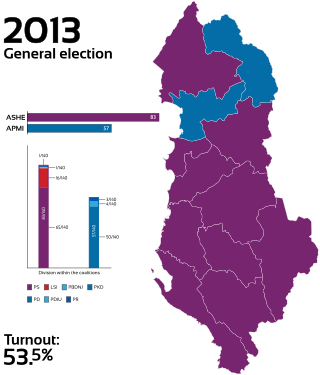Related Research Articles

Sali Ram Berisha is an Albanian conservative politician and former cardiologist who served as the second President of Albania from 1992 to 1997 and Prime Minister from 2005 to 2013.

Edi Rama is an Albanian politician, painter, writer, former university lecturer, publicist and former basketball player, who has served as the 33rd and current Prime Minister of Albania since 2013 and chairman of the Socialist Party of Albania since 2005. Prior to his tenure as Prime Minister, Rama held a number of positions. He was appointed Minister of Culture, Youth and Sports in 1998, an office he held until 2000. First elected mayor of Tirana in 2000, he was reelected in 2003 and 2007.

Fatos Thanas Nano is an Albanian socialist politician who served as Prime Minister of Albania in 1991, from 1997 to 1998 and from 2002 to 2005. He was the first leader and founder of the Socialist Party of Albania and a member of the Albanian Parliament from 1991 to 1993 and 1997 to 2009. He reformed the anti-revisionist Marxist-Leninist ideology of the Labor Party of Albania into social democracy for its successor, the Socialist Party. During his leadership, the Socialist Party, as a result of reforms, joined the Socialist International and Party of European Socialists. Nano was a candidate in the 2007 presidential election but did not win. He again tried in the 2012 presidential election, but he did not even qualify as a candidate, because the leaders of parties in Parliament obstructed their respective MPs to elect him as candidate in the elections.

The Democratic Party of Albania is a conservative political party in Albania. It has been the largest opposition party in the country since 2013.

Azem Shpend Hajdari was the leader of the student movement in 1990–1991 that led to the fall of communism in Albania. He then became a politician of the Democratic Party of Albania (DP). He symbolizes the start of the democratic era in Albania. He was a member of the Albanian parliament and the Chairman of the Defence Parliamentary Commission. He was assassinated in Tirana on September 12, 1998.

The Qemal Stafa Stadium, named after Qemal Stafa (1920–1942), a World War II hero, was a national stadium and the largest football stadium in Tirana, Albania. Construction started in 1939 and the stadium was inaugurated in 1946 for the Balkan Cup, which was won by the Albania national football team. The stadium has been used for football matches of the Albanian Superliga and the national team, athletic events, and the six Albanian Spartakiads. Although it was enlarged in 1974 to accommodate up to 35,000 spectators, in the 1990s it became an all-seater stadium, and its capacity was reduced to 19,700.

The Albanian Rebellion in 1997 was sparked by pyramid scheme failures in Albania soon after its transition to a market economy. The government was toppled and more than 2,000 people were killed. Various other sources also describe the violence that ensued as a rebellion, or a rebellion that gradually escalated into a civil war.

Bamir Myrteza Topi is an Albanian diplomat and politician. He also was the President of Albania from July 2007 to July 2012.

Arben Minga was an Albanian professional footballer, who played as a striker and later in his final years as a centre-back.
Bilal Xhaferri was an Albanian writer and political dissident against the Albanian communist regime. He is seen as the representative poet of the Albanian Chameria.
The fall of Communism in Albania, the last such event in Europe outside the Soviet Union, started in December 1990 with student demonstrations in the capital, Tirana, although protests started in January that year in other cities like Shkodra and Kavaja. The Central Committee of the communist Party of Labour of Albania allowed political pluralism on 11 December and the largest opposition party, the Democratic Party, was founded the next day. March 1991 elections left the Party of Labour in power, but a general strike and urban opposition led to the formation of a "stability government" that included non-communists. Albania's former communists were routed in elections in March 1992 amid economic collapse and social unrest, with the Democratic Party winning most seats and its party head, Sali Berisha, becoming president.
In 1991, the Socialist Party of Albania, with specific social democratic ideology took control of the country through democratic elections. One year later the Democratic Party of Albania won the new elections. After 1990, Albania has been seeking a closer relationship with the West. What followed were deliberate programs of economic and democratic reform, but Albanian inexperience with capitalism led to the proliferation of pyramid schemes – which were not banned due to the corruption of the government. Chaos in late 1996 to early 1997, as a result of the collapse of these pyramid schemes, alarmed the world and prompted the influx of international peacekeeping forces. In 1995, Albania was accepted into the Council of Europe and requested membership in NATO and is a potential candidate country for accession to the European Union. The workforce of Albania has continued to emigrate to Western countries, especially Greece and Italy.

Krahu i shqiponjës is an Albanian national magazine that first appeared in the democratic post-communist period, in Tirana (Albania), in 1995, in progress of Bilal Xhaferri's magazine, which was published in Chicago, United States. The spiritual leader was and still remains Bilal Xhaferri.

TemA is a politically unaffiliated daily newspaper published in Tirana, Albania in the Albanian language. Founded in July 1999, TemA is one of the oldest daily newspapers in Albania and currently sells about 15,000 daily copies nationwide.

Bujar Nishani was an Albanian politician. He served as President of Albania from 24 July 2012 to 24 July 2017.

The 2011 Albanian opposition demonstrations were a series of anti-government protests in cities around Albania following 18 months of political conflict over alleged electoral fraud by the opposition. A video surfaced which portrayed the deputy prime minister arranging a corrupt deal with the minister of economy. The public outcry over the video resulted in the resignation of the deputy prime minister. A demonstration was called by parliamentary opposition parties, which include the Socialist Party and the Unity for Human Rights Party. These were called on 21 January in order to protest the alleged corruption of the Albanian government as well as widespread unemployment and poverty in the country.
The following lists events from the year 2011 in Albania.
Kasëm Trebeshina was an Albanian member of national resistance during World War II part of the National Liberation Movement, an actor, translator, communist prosecutor and writer. He was one of the founders of the notorious communist secret police Sigurimi.

Parliamentary elections were held in Albania on 23 June 2013. The result was a victory for the Alliance for a European Albania led by the Socialist Party and its leader, Edi Rama. Incumbent Prime Minister Sali Berisha of the Democratic Party-led Alliance for Employment, Prosperity and Integration conceded defeat on 26 June, widely viewed as a sign of growing democratic maturity in Albania.
The following lists events that happened during 2012 in the Republic of Albania.
References
- ↑ "I vetëdjeguri i Pogradecit: U solidarizova me grevën në Tiranë". Gazeta Tema. Retrieved 2012-10-15.
- ↑ "Gjergj Ndreca, Albania Ex-Political Prisoner, Sets Himself On Fire = Huffington Post". 2012-10-08. Retrieved 2012-10-08.
- ↑ "Second former political prisoner sets himself on fire in Albania". Montreal Gazette. Archived from the original on 2013-01-29. Retrieved 2012-10-15.
- ↑ "Albania's president seeks resolution to hunger strike, fires". SETimes. Retrieved 2012-10-15.
- ↑ "Strike a tragic situation". Top Channel. Archived from the original on 2016-02-03. Retrieved 2012-10-15.
- ↑ "Shqiptarët e Amerikës, protestë para OKB-së pro grevistëve të urisë". Gazeta Tema. Retrieved 2012-10-15.
- ↑ "Ex politician prisoners vow fast to death". Balkan Insight. Retrieved 2012-10-15.
- ↑ "berisha-greva-drejtohet-nga-pijanece-bixhozxhinj-e-kriminele-skender-tufa-ngriti-bordello-ne-mes-te-tiranes". Gazeta Tema. Retrieved 2012-10-15.
- ↑ "Greva ish-të burgosurve, Berisha: Është politike, udhëhiqet nga një kriminel ordiner". Gazeta Shekulli. Archived from the original on 2012-10-17. Retrieved 2012-10-15.
- ↑ "Strike led by incriminated people". Top Channel. Archived from the original on 2013-09-26. Retrieved 2012-10-15.
- ↑ "Albanian Government Dialogue". Gazeta Tema. Retrieved 2012-10-17.
- ↑ "ALBANIA: GOVERNMENT SHOULD HONOUR THE RIGHTS OF FORMER POLITICAL PRISONERS". Amnesty International. Retrieved 2012-10-17.
- ↑ "Albania court rules 26 day hunger strike illegal". ABC News. Retrieved 2012-10-17.
- ↑ "The court of Tirana, the decision to suspend hunger strike, illegal". Shekulli. Retrieved 2012-10-17.
- ↑ "Albanian communist-era dissidents end hunger strike". Reuters. Retrieved 2012-10-22.
- ↑ "Albania ex-dissident dies after self-immolation protest". BBC. Archived from the original on November 3, 2012. Retrieved 2012-11-02.
- ↑ "Topi për Lirak Bejkon: Ishte një hero i demokracisë". Gazeta Tema. Retrieved 2012-11-02.
- ↑ "PD: Life of Lirak Bejko, a drama finalized for votes by Rama". Albanian National News Agency. Archived from the original on 2013-09-26. Retrieved 2012-11-02.
- ↑ "PM condoles family Lirak Bejkos". Klan News. Archived from the original on 2012-11-05. Retrieved 2012-11-02.